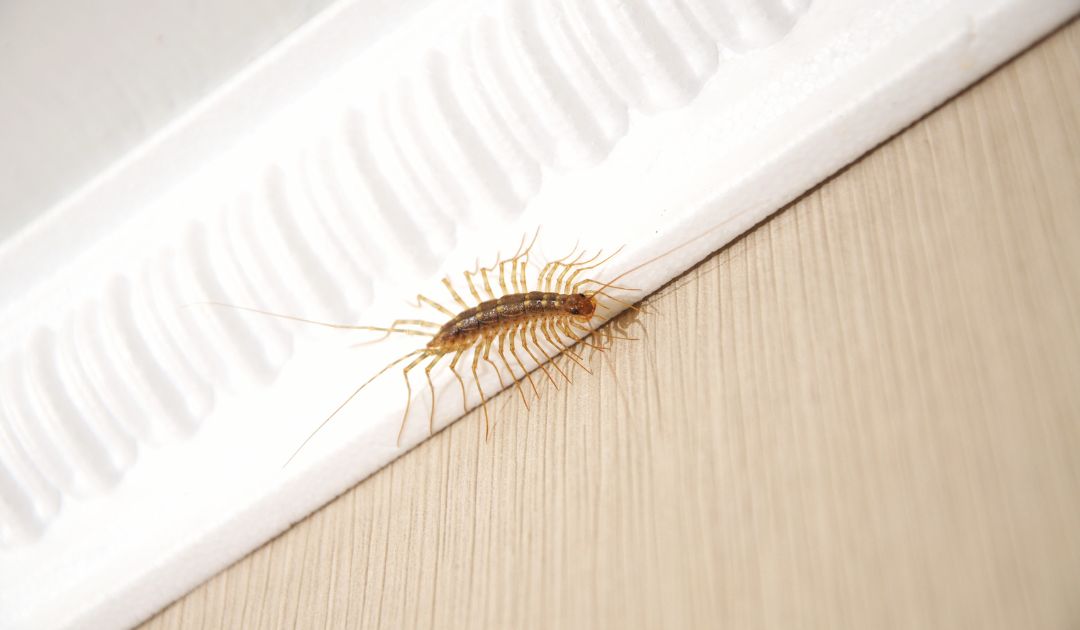House centipedes are much more than meets the eye. Despite their offputting appearance, they’re not your standard pest as they can actually do a lot of good in your home. However, their presence can be a sign of other critter problems. If you’ve seen an uptick in house centipedes around your home, reach out to Smash Pest Control. We can evaluate your property and deal with your pest problem. Call us now at 615-581-7473 or request an appointment online.
Why Do I Have House Centipedes in My Home?
You’ve spotted a house centipede darting across your living room floor – what’s the story behind their sudden appearance? House centipedes love damp environments, so if your home has excess moisture, you practically have a neon “welcome” sign right by your front door. They’re often found in basements, bathrooms, and laundry rooms where humidity levels are higher.
House centipedes are also attracted to homes that provide easy access to food. If you have a small insect problem – like spiders or cockroaches – you might inadvertently be inviting house centipedes into your space as they search for a meal. These little guys are nature’s pest controllers, but when they invade your home, they can become pests themselves.
How Do I Get Rid of House Centipedes?
If house centipedes have decided to take up residence in your home, don’t panic. There are simple – but effective – ways to evict them. We can start by addressing the conditions that attract them. Here’s how you can keep them at bay:
- Reduce moisture. Fix any leaks in your plumbing and use dehumidifiers in damp areas to lower humidity levels.
- Seal entry points. Check your home for gaps and cracks where centipedes might sneak in. Seal these entry points with caulk or weather stripping.
- Declutter. House centipedes love to hide in clutter. Keep your living areas tidy and remove piles of clothes, papers, and boxes that could serve as hiding spots.
- Use natural deterrents. Essential oils such as peppermint or lavender are known to repel house centipedes. Mix a few drops with water in a spray bottle and apply it to potential entry points.
- Call Smash Pest Control. If the situation feels overwhelming, don’t hesitate to reach out to Smash Pest Control. Our team of experts can assess the situation and provide a customized pest control plan that fits your needs.

What Do House Centipedes Eat?
With their lightning-fast movements and venomous bites, house centipedes are fearsome predators. These carnivorous creatures have a taste for small insects and often feast on other household pests like cockroaches, silverfish, spiders, and even bed bugs.
In their own way, house centipedes are helpful creatures, patrolling your home for other critters. However, their presence often indicates a larger pest problem that may be happening right under your nose. It’s like finding a wolf in your hen house – while it might catch a few rodents, it’s ultimately a sign of a bigger issue. Don’t let this problem fester, take immediate action to eliminate the root cause. By eliminating their food source, you can discourage house centipedes from entering your home.
Where Do House Centipedes Hide in the House?
If you’re on the hunt for house centipedes, you’ll want to check some common hiding spots. These elusive pests tend to prefer dark and damp areas where they can blend in and stay out of sight. Their preferred haunts include:
- Basements. A popular hideout for house centipedes, especially if the area is poorly lit and damp.
- Bathrooms. The moisture in bathrooms creates a perfect environment for house centipedes.
- Crawl spaces and attics. If your home has an unfinished basement or a cluttered attic, these spaces can be ideal for centipedes to hide.
- Under appliances. Stoves, refrigerators, and washing machines provide both darkness and a potential food source.
Do House Centipedes Bite Humans?
The good news is that while house centipedes can bite, they typically do so only when threatened. Although it can be quite painful, their bite is not considered dangerous to humans because their venom is designed for paralyzing small insects. Symptoms of a house centipede bite may include mild swelling, redness, and discomfort.
In most instances, they’d rather scurry away than confront you. If you do encounter one, it’s best to let them be – unless they’re causing you distress, in which case, a gentle capture and release might be in order.
How Long Do House Centipedes Live?
The lifespan of a house centipede can range from three to five years, depending on environmental factors and food availability. While they may live longer than you’d expect, their lifespan doesn’t mean they need to become permanent residents in your home. With proper pest control and preventive measures, you can keep your home centipede-free and enjoy your space without fear.
House Centipedes Bugging You? Call Smash Pest Control Today
Smash Pest Control is committed to helping Middle Tennessee homeowners sleep soundly, knowing their homes are free from creepy crawlers like house centipedes and the problems they represent. Send your house centipedes packing and contact Smash Pest Control today for a free estimate. Take control of your home back from unwanted pests. Reach out to us online or at 615-581-7473.


Recent Comments